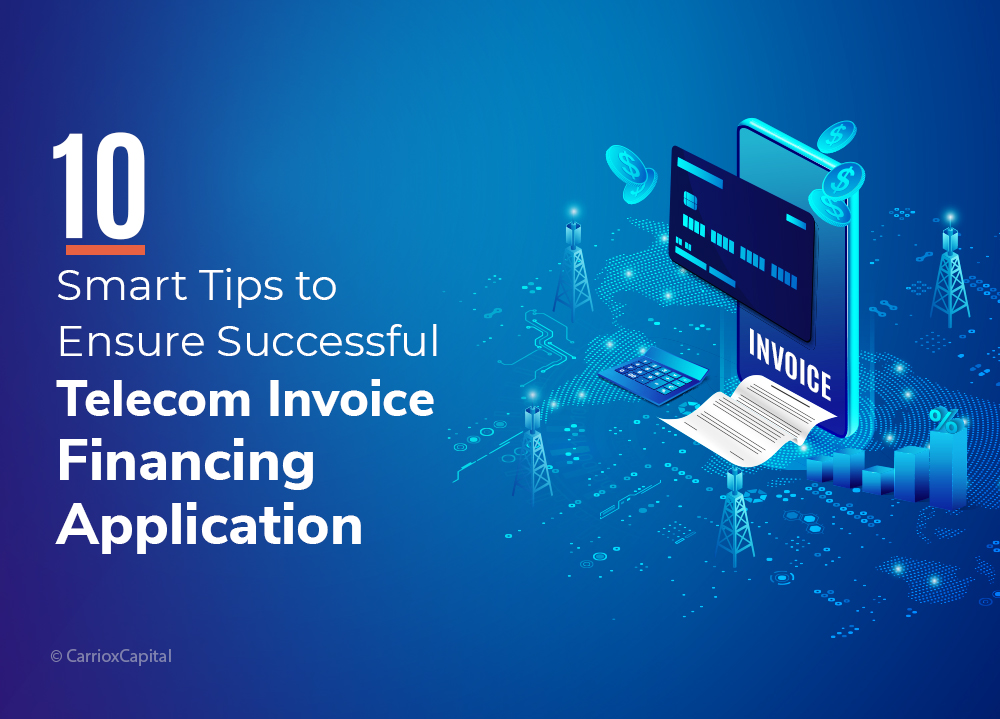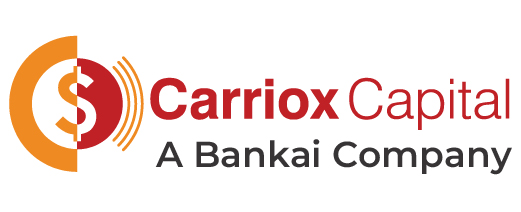10 Smart Tips to Ensure Successful Telecom Invoice Financing Application

Wireless service providers are quickly expanding their 5G networks, driving a remarkable rise in the demand for cell tower construction companies and subcontractors. However, Telecom construction companies run short of funds because of long payment cycles and outstanding invoices.
Company owners may consider business loans and lines of credit, but their time-consuming approval process and daunting underwriting requirements make them unfit for telecom companies. According to GSMA, mobile operators across the globe will require capex (capital expenditure) investment of over $600 billion between 2022 and 2025, 85% of which will be directed toward 5G networks.
Here, invoice financing for telecom companies can prevent constructors’ goals from slipping into the abyss by maintaining a stable and predictable cash flow. In addition, accounts receivable financing for telecom operations can relieve the burden of cell tower constructors by ensuring sufficient working capital to cover operating costs.
Qualifying for telecom invoice factoring may be easier than any other conventional financing. Still, it is crucial to ensure the records and paperwork are aligned with the creditworthiness of your customers. In this blog, we’ll understand the need for accounts receivable financing for telecom operations and a pre-requisites checklist for you to get past due diligence reasonably quickly.
Why Telecom Companies May Need Accounts Receivable Financing?
Accounts receivable financing is an assets-based funding solution that gives businesses immediate access to working capital. Invoices or receivables are highly liquid assets that can serve as collateral for 80-90% of the invoice value based on your company’s profile.
When a telecom company is running low on cash flow, it’s difficult to meet obligations, such as payroll, payments to equipment suppliers, debt repayments, and many operating costs. In such a situation, invoice financing for telecom companies will help unlock cash flow and allow them to take on new growth opportunities and be competitive.
The cash received from invoice factoring can solve issues regarding upfront and operating expenses involved in the following telecom business activities:
- Rent and utilities
- Payroll and hiring
- Lawyers and consultants
- Purchasing equipment and supplies
- Cable installation
- Cell tower erection, upgradation, and repairs
- BTS (Base Transceiver Station) installation
- OSP (outside plant) engineering and installation
A dependable cash flow offers telecom companies a runway to grow business by increasing efforts in research and development, branding, marketing, and training on new technology.
A Checklist of Pre-requisites for Telecom Invoice Factoring
Considering Accounts Receivable Financing Costs
Accounts receivable financing costs depend on the factoring company that will determine different costs involved in invoice financing based on the following factors:
- Number of invoices from which you want to release funds
- Value of each invoice
- Track record of your customers
- Size of your business
Since factoring costs vary by lender, estimate all factoring fees beforehand. Factors charge a low monthly or weekly discount rate calculated against the value of invoices financed. Therefore, companies with fast-paying customers will benefit more than those with slow-paying clients. Additional costs include an origination fee, wire transfer fee, early termination fee, etc.
Reviewing Terms of Accounts Receivable Financing for Telecom Operations
Invoice financing terms offered by lenders vary by industry and sector, but it remains one of the best funding options for kick-starting telecom operations. Companies must review the maximum limit for the loan amount, repayment terms, and the advance rate. Most factoring companies fund 90% of the invoice value within three days, but complex arrangements may require a week or ten days.
Check Qualification Requirements
A lot of factors influence the factoring qualifications required by different lenders. For example, some lenders may ask for monthly sales worth $5000, and some may require an annual revenue of about $50000. The credit score is one of the most important qualifying elements, but that might not matter if your business and government customers are creditworthy. Other qualification requirements may include operational history, your time in business, and a bunch of paperwork.
Take Stock of Invoices from Creditworthy Clients
The quality of outstanding invoices is the most crucial thing to consider while determining your invoices. Since your customers will be paying invoices sold to factors, they are most concerned with their creditworthiness. Therefore, it is recommended that you take stock of invoices from customers who honor debts, have reputable, solid credit, and have good references with other suppliers.
Consider Underwriting Criteria
The concentration of invoices, contras, payment terms, progress bills, and pre-bills are some underwriting criteria that factoring companies assess for accounts receivable financing. If large corporations and financially stable customers owe accounts receivable, the factoring company is more willing to pay a large proportion of the face number of invoices.
Similarly, the invoices’ age will affect the financial agreement’s terms. For example, new invoices with shorter-term receivables will lead to terms, and old invoices with delinquent or long-term receivables will lead to a lower principal-to-value ratio.
Payable Aging Report
Accounts receivable or payable aging report is essential to the factoring paperwork. This document contains all the outstanding invoices, credit memos, and notes by date. Factoring companies use this report to verify and assess your client’s creditworthiness. In addition, it helps factors keep track of unpaid invoices and pending money and determine when they will probably receive payments.
Ensure there are No Guaranteed Sales and Pay-when-paid Clauses
The due diligence team of any factoring company would review your contracts with the customers to ensure no provisions could hinder the financing process.
A guaranteed sale clause allows your client the option to return any unsold products and claim a charge-back. Pay-when-paid sales contract means your client will pay you if their customers pay for them.
It would be safest if you avoided these clauses since the factoring company will perceive these to be a significant credit risk as the ultimate value of the invoice cannot be determined.
Articles of Organization or Incorporation
Factoring companies ask for basic business details, the company’s ID, business license, and articles of partnership or incorporation. These documents enable them to verify that your company is legitimately set up and registered with agencies, government, or otherwise to prevent fraud. They may also ask for personal ids, such as your passport, social security number, or driver’s license, for the same reason.
Tax ID and Most Recent Tax Returns
You must provide a government-issued tax identification number and most recent tax returns so that the factoring company can check whether you have delinquent tax payments. If there is any history of such payments, the statutory body can file a tax lien against your firm. It means the statutory body can claim payments of factored invoices even before the factoring company.
Completed Factoring Application
A well-completed factoring application with all the required information can increase your chances of getting an accurate invoice factoring quote. For example, the online or offline application form may ask for business or personal contact, monthly invoicing volume, bank account details, etc.
Get Started with your Invoice Factoring Application using this Checklist
While ensuring uninterrupted delivery of high-quality voice, SMS, and data services backed by the latest network innovations, telecom, and cell tower construction companies may find themselves cash-strapped. It can lead to severe issues like unpaid debt, unpaid staff wages, and loss of contracts. If you are ready with the prerequisites mentioned in the checklist, you must not wait further to address your short-term cash flow gaps. Besides allowing smooth operations, telecom invoice factoring will help you grab new opportunities to expand your network.
Carriox is a specialty invoice financing company providing direct capital to cell tower companies to help them drive business revenue through seamless cash flow.

Aditi Shembekar
Aditi is a Content Lead at Panamax, Inc. She believes that “Writing is an art, a passion, love.” Applying these thoughts in her writing, she always put her strong efforts while writing on any topic. She loves writing and technology is her favorite part. Meanwhile, in her "ME" time she loves watching movies and trying new recipes.

